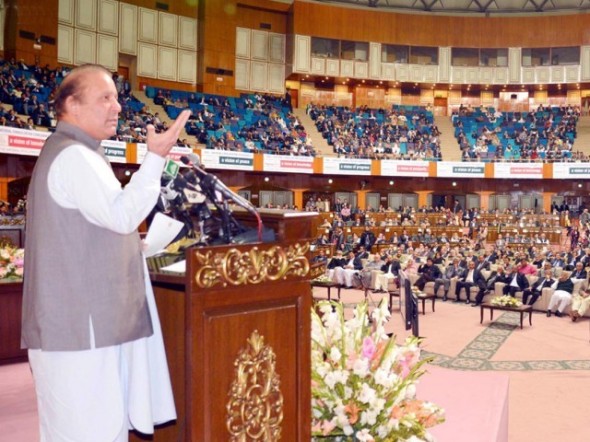The inaugural session of the National Consultation Conference on Pakistan Vision 2025 and the11th Five-year plan 2013-2018 took place in Islamabad on 22nd of November 2013. The conference was organised by the Ministry of Planning, Development and Reforms. The event was attended by Prime Minister Nawaz Sharif, chief ministers, federal ministers, members of Parliament, diplomats and around 1,000 representatives from the private and public sectors including members of think tanks, academia, journalists and business leaders.
The inaugural session was addressed by Prime Minister Nawaz Sharif, Finance Minister Ishaq Dar, Minister for Planning and Development Ahsan Iqbal and Secretary of Planning Commission Hassan Nawaz Tarar. Discussions centred on: achieving an integrated energy sector, economic self-reliance, development of human and social capital, promoting value-addition in the agriculture sector, modernisation and development of infrastructure, enhancing regional connectivity, promoting SMEs and private sector led growth, and comprehensive reforms for security, institutionalisation and democratic governance.
Addressing the conference, the Prime Minister said that the government after much deliberation had opted for the policy of dialogue to combat terrorism. He declared that the drone attack that killed Hakimullah Mehsud had significantly hampered attempts to initiate a dialogue process with the Taliban. He expressed deep concern over the latest drone strike in Hangu district that killed nine people and termed it an “injustice against Pakistan,” calling the attacks abusive and cruel.
He added that the government is committed to eliminating terrorism and has introduced strict laws to ensure that terrorist are given exemplary punishments with no option of bail. The Prime Minister also stated that further constitutional amendments would be introduced with regard to sectarian violence and terrorist activities.
The Prime Minister cautioned that economic and security issues must not be politicised. He added that the present state of lawlessness, terrorism, unemployment and lack of education is such that measures required to eradicate these problems need to be extraordinary and revolutionary. “In this regard, all the federating units will have to play their due role,” he said.
He disclosed that the government had formulated economic reforms and incentive packages for the private sector in order to attract maximum investment.
Nawaz Sharif emphasized the role of the youth in the economic development of the country. He said that the government would be launching a major scheme under which loans will be skilled young men and women, at a low mark-up in order to increase access to capital.
Directing attention towards the energy crisis, the Prime Minister claimed that the duration of power outages had significantly reduced since PML-N assumed power. He elaborated saying, “We retired circular debt of over five hundred billion rupees. We do not take credit of this as we need to do more to overcome this issue, which cannot be overcome overnight.”
The Prime Minsiter stated that overcoming the electricity crisis would take four years. “Work on Diamer-Bhasha and Dasu dams will be started simultaneously besides we also plan to launch Bunji project. These three projects will add about 16000 megawatts of electricity to the national grid,” he added. He said that the government was striving to complete these long-term projects in the minimum possible time. Furthermore, the Prime Minister stated that the government is working to ensure an uninterrupted gas supply to industrial and commercial users and believed that the project from Khunjerab to Gwadar will translate into prosperity for the entire region.
Laying emphasis on the country’s need of speedy justice, he expressed regret over the infinite delay in court hearings. He added, “It is my sincere wish to make Pakistan a citadel of peace, where its citizens feel secure and there are no threats to life and property, terrorism, dacoties and kidnapping for ransom.”
He reiterated the federal government’s desire for maintaining harmony among all federating units. Acknowledging the presence of the four chief ministers, the Prime Minister declared that they were all equally important and expressed his strong belief in the system. He recalled the Charter of Democracy that he endorsed with former Prime Minister Benazir Bhutto confirming his continued commitment and dedication to the charter. He termed the interests of the country as his “supreme priority” even when he was in opposition in the previous regime.
Finance Minister Ishaq Dar highlighted the performance of the government during the course of the last five months saying that the government had taken consolidated steps to reduce the budget deficit and projects have been initiated in the power sector which will generate an increase of 8600 megawatt of electricity during the next four years. He also confirmed that with the payment of Rs. 500 billion circular debt, additional 1700 MW electricity is being generated. The government is also proceeding to import cheaper LPG for overcoming the energy crisis and is looking forward to introduce the first hydro-carbon policy in the first quarter of the next year.
On the economic front, steps are being taken to expand the tax base for generating increased revenues. Ishaq Dar said that the investment target for the next three years has been set at 20% of GDP growth. Over the last five months, he stated that exports had grown by 9% while tax collection had increased by 18%.




